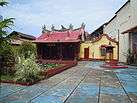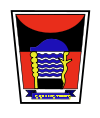Padang
| Padang | |||||||||
|---|---|---|---|---|---|---|---|---|---|
| City | |||||||||
| Other transcription(s) | |||||||||
| • Jawi | ڤادڠ | ||||||||
(From top, left to right): Skyline of Padang, Adityawarman Museum, Grand Mosque of West Sumatra, Tour de Singkarak, Padang old town, Klenteng See Hin Kiong, and Imam Bonjol Park. | |||||||||
| |||||||||
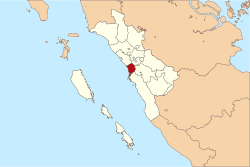 Location of Padang in West Sumatra | |||||||||
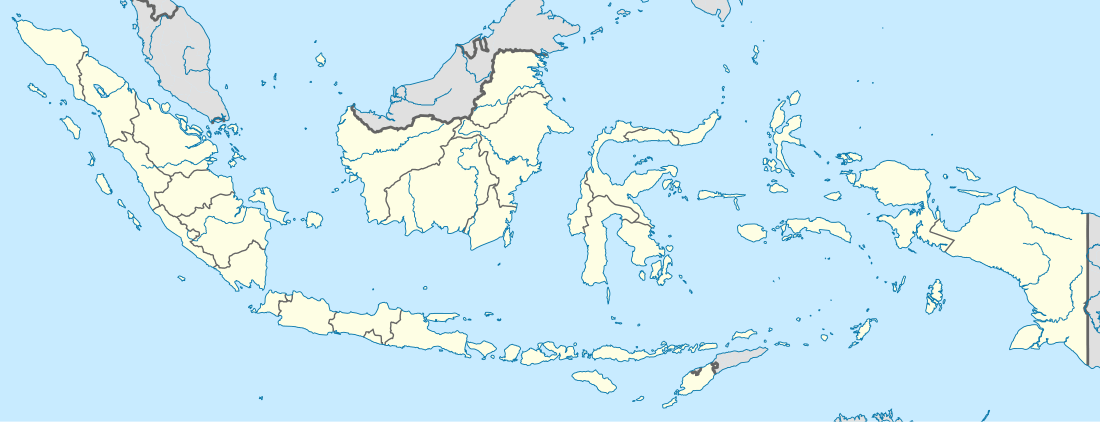 Padang Location of Padang in Indonesia | |||||||||
| Coordinates: 0°57′0″S 100°21′11″E / 0.95000°S 100.35306°ECoordinates: 0°57′0″S 100°21′11″E / 0.95000°S 100.35306°E | |||||||||
| Country | Indonesia | ||||||||
| Province | West Sumatra | ||||||||
| Founded | 7 August 1669 | ||||||||
| Government | |||||||||
| • Mayor | Mahyeldi Ansharullah | ||||||||
| Area | |||||||||
| • Total | 695 km2 (268 sq mi) | ||||||||
| Elevation | 0-1,853 m (0-6,079 ft) | ||||||||
| Population (2014) | |||||||||
| • Total | 1,000,096 | ||||||||
| • Density | 1,438.98/km2 (3,726.9/sq mi) | ||||||||
| Demonym(s) | Padangnese | ||||||||
| Time zone | WIB (UTC+7) | ||||||||
| Area code(s) | +62 751 | ||||||||
| Climate | Af | ||||||||
| Website | www.padang.go.id | ||||||||
Padang (Indonesian pronunciation: [ˈpadaŋ] Jawi: ڤادڠ) is the capital of the province of West Sumatra in Indonesia. It is the largest city on the western coast of Sumatra. Before Indonesia's independence, Padang was one of the major cities in the Dutch East Indies[1] and nowadays the fifth largest city in Sumatra behind Medan, Batam, Palembang and Pekanbaru. It has an area of 695 square kilometres (268 sq mi) and the population of 1,000,096 in 2014.[2]
Padang is one of the cleanest big cities in Indonesia. Up to 2009, Padang has received the "Adipura" (cleanest and greenest city) award in the category of large city 17 times and the "Adipura Kencana" award three times.
Padang is exactly at the antipodes of Esmeraldas, Ecuador.
History
![]() Dutch Empire 1663-1781
Dutch Empire 1663-1781
![]() British Empire 1781-1784
British Empire 1781-1784
![]() Dutch Empire 1784-1795
Dutch Empire 1784-1795
![]() British Empire 1795-1819
British Empire 1795-1819
![]() Dutch Empire 1819-1942
Dutch Empire 1819-1942
![]() Empire of Japan 1942-1945
Empire of Japan 1942-1945
![]() Republic of Indonesia 1945-present
Republic of Indonesia 1945-present
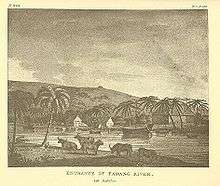
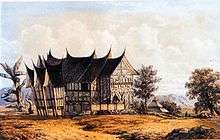
Since the 16th century Padang has been a trade centre. During the 16th and 17th centuries pepper was cultivated and traded with India, Portugal, the United Kingdom and the Netherlands. In 1663 the city came under the authority of the Dutch and a trading post was built here in 1680. The city came under the British Empire twice, the first time from 1781 to 1784 during the Fourth Anglo-Dutch War, and again from 1795 to 1819 during the Napoleonic Wars. Afterwards the city was transferred back to the Netherlands. Up to approximately 1780 the most important trade product was gold, originating from the gold mines in the region. When the mines were exhausted, the emphasis turned to other products such as coffee, salts and textiles.
In 1797 Padang was inundated by a tsunami with an estimated flow depth of 5–10 meters, following an earthquake, estimated to be 8.5–8.7 Mw, which occurred off the coast. The shaking caused considerable damage and the deaths of two people, while the tsunami resulted in several houses being washed away and several deaths at the village of Air Manis. The boats moored in the Arau river ended up on dry land, including a 200-ton sailing ship which was deposited about 1 kilometre upstream. In 1833 another tsunami inundated Padang with an estimated flow depth of 3–4 meters as a result of an earthquake, estimated to be 8.6–8.9 Mw, which occurred off Bengkulu. The shaking caused considerable damage in Padang, and due to the tsunami the boats moored in the Arau river broke their anchors and were scattered.[3]
The population of Padang in 1920 was 28,754, the second largest city in Sumatra behind Palembang.[4] At the time of independence in the 1940s the city had around 50,000 inhabitants. Coffee was still important, but copra was also a major item produced by farmers in its hinterland. The population growth since then has been partly a result of growth in the area of the city, but largely is a result of the migration to major cities seen in so many developing nations. In 1950 there was development of the Ombilin coal field with Padang as its outlet. This was seen by some observers as reflecting the economic as well as political colonisation of Indonesia.
On 30 September 2009, a 7.9 magnitude earthquake hit about 50 kilometres off the coast of Padang. There were more than 1,100 fatalities, 313 of which occurred within Padang.[5][6][7]
Administrative districts
| Historical population | ||
|---|---|---|
| Year | Pop. | ±% |
| 1819 | 8,500 | — |
| 1874 | 25,000 | +194.1% |
| 1920 | 28,754 | +15.0% |
| 1930 | 40,744 | +41.7% |
| 1961 | 143,699 | +252.7% |
| 1971 | 350,277 | +143.8% |
| 1980 | 480,922 | +37.3% |
| 1990 | 631,263 | +31.3% |
| 2010 | 833,562 | +32.0% |
| 2013 | 876,678 | +5.2% |
The city of Padang is divided into 11 districts (kecamatan):
- Bungus Teluk Kabung
- Koto Tangah
- Kuranji
- Lubuk Begalung
- Lubuk Kilangan
- Nanggalo
- Padang Barat
- Padang Selatan
- Padang Timur
- Padang Utara
- Pauh
Transportation
Padang is well-connected by road, air, rail and sea. There are many public transport within city and intercity. There are several transportation modes in Padang such as taxi, bus, minibus, ojek (motorcycle taxi) and Trans Padang (bus rapid transit).You also can connect to online local transportation in padang by visit Jekline Padang Website
Public transport
The TransPadang bus rapid transit service was developed used Jakarta's TransJakarta system as a model, but without dedicated lane and comfortable shelters. Nowadays, Trans Padang only serves from Lubuk Buaya to Pasar Raya along 18 km in fleet 10 large buses (capacity 60 person) and 15 medium buses (capacity 40 person). with daily ridership about 7000 in corridor 1 increase from initial operation about 4000. load factor 128% in morning and dusk.
| Corridor # | Origin-Destination | Opened [8] |
|---|---|---|
| 1 | Lubuk Buaya - Pasar Raya | February 2014 |
| 2 | Bungus - Pasar Raya | planned |
| 3 | Air Pacah - Pasar Raya | planned |
| 4 | Teluk Bayur - Lubuk Buaya | planned |
| 5 | Indarung - Pasar Raya | planned |
| 6 | Limau Manis - Pasar Raya | planned |
Airport
The city is served by the newly opened Minangkabau International Airport in Ketaping, Padang Pariaman. It replaces the old Tabing Airport, which is currently used as a military base. There is one terminal building for both international and domestic flights. The airport has 4 aerobridges, 17 check-in counters, 5 baggage conveyors, and 9 ticket sales counters.[9] In late 2013, the runway was lengthened to 250 m so that it could accommodate Boeing 747 and Airbus A340 planes, and there is also a plan to connect the airport to the city of Padang with train service.[10] The terminal expansion (Phase II) has been announced and the rendering is already released on Angkasa Pura 2 website.[11]
Seaport
Padang's Teluk Bayur harbour (former Emmahaven Port) is the largest and busiest harbour on the west coast of Sumatra. It serves inter-island as well as international routes. It was built in 1888 by the colonial government of the Netherlands. On 29 April 2013 a new container terminal was officially opened by West Sumatra Governor and can serve more than 4,000 containers in 46,886 square-meter area.[12] It is the main gateway to the Mentawai islands including Siberut, Sipora, and South Pagai. There are also ferry connections between Padang to Jakarta and Sibolga next to Gunung Sitoli (Nias).
Toll road
West Sumatra administration has secured lands for the construction of a 27-kilometer toll road between Padang and Sicincin district with about Rp.1.3 trillion ($141.7 million) investment. 80 percent of the land with a width of 30 meters has been acquired, but they will acquire more land to meet an ideal width of 50 meters. The construction project will be initialised in 2012.[13]
Railroad
Railroad tracks connect Padang to Pariaman to the north, Padangpanjang to the northeast, Solok and Sawahlunto to the east. The largest train station is Padang Station, known as Simpang Haru station. Sibinuang and Dang Tuanku provides the trip services from Padang (Simpang Haru) to Pariaman vice versa.
Education
Minangkabau people highly respect education. Many intellectual figures come from West Sumatra. There are two institutes of higher education in Padang, i.e. Andalas University and the State University of Padang. Andalas University is the oldest university in Indonesia outside of Java. The main campus is located at Limau Manis, about 12 kilometres (7.5 mi) from the centre of Padang. The Faculty of Medicine and Faculty of Dentistry are located in the city centre, near the Central General Hospital M. Djamil. State University of Padang located in Air Tawar.
The other universities in Padang are Imam Bonjol State Institute of Islamic Literature, Institut Teknologi Padang in Lapai, Bung Hatta University in Ulak Karang, Baiturrahmah University in Air Pacah, Universitas Putra Indonesia YPTK, Ekasakti University, Universitas Muhammadiyah Sumatera Barat, and Tamansiswa University.
The local library of West Sumatra, located in Padang is considered as one of the best Libraries in Indonesia, with the number of collection of 30 k titles, including facilities and maximum conserve, and the highest number of Encyclopedic visitors.
| Formal education | state and private Elementary School neither Madrasah Ibtidaiyah (MI) | state and private Junior High (JHS) or MTs | state and private SHS | state and private MA | state and private Vocational High School (VHS) | College | ||||||
|---|---|---|---|---|---|---|---|---|---|---|---|---|
| Quantity | 477 | 129 | 49 | 10 | 42 | 58 | ||||||
| Data sekolah di Kota Padang Source:[14][15][16] | ||||||||||||
Climate
Padang features a tropical rainforest climate under Köppen’s climate classification. Padang is one of Indonesia’s wettest cities, with frequent rainfall throughout the course of the year. The city averages roughly 4300 mm of rain per year. Padang’s driest month is February, where 250 mm of precipitation on average is observed. The city temperatures are relatively constant throughout the year, with an average of 26 degrees Celsius.
| Climate data for Padang | |||||||||||||
|---|---|---|---|---|---|---|---|---|---|---|---|---|---|
| Month | Jan | Feb | Mar | Apr | May | Jun | Jul | Aug | Sep | Oct | Nov | Dec | Year |
| Record high °C (°F) | 33.9 (93) |
34.4 (93.9) |
33.9 (93) |
33.3 (91.9) |
33.9 (93) |
33.9 (93) |
33.3 (91.9) |
33.3 (91.9) |
32.8 (91) |
33.3 (91.9) |
32.8 (91) |
32.8 (91) |
34.4 (93.9) |
| Average high °C (°F) | 30.6 (87.1) |
31.7 (89.1) |
31.7 (89.1) |
31.7 (89.1) |
32.2 (90) |
32.2 (90) |
31.7 (89.1) |
32.2 (90) |
32.2 (90) |
31.7 (89.1) |
31.1 (88) |
30.6 (87.1) |
31.6 (88.9) |
| Daily mean °C (°F) | 27.0 (80.6) |
27.0 (80.6) |
27.0 (80.6) |
27.2 (81) |
27.5 (81.5) |
27.0 (80.6) |
25.0 (77) |
25.0 (77) |
26.7 (80.1) |
26.7 (80.1) |
26.7 (80.1) |
26.7 (80.1) |
26.6 (79.9) |
| Average low °C (°F) | 23.3 (73.9) |
24.4 (75.9) |
23.9 (75) |
23.9 (75) |
23.9 (75) |
23.9 (75) |
23.3 (73.9) |
23.3 (73.9) |
23.9 (75) |
23.9 (75) |
23.9 (75) |
23.9 (75) |
23.8 (74.8) |
| Record low °C (°F) | 21.1 (70) |
20.6 (69.1) |
21.1 (70) |
21.7 (71.1) |
21.7 (71.1) |
20.0 (68) |
21.1 (70) |
20.6 (69.1) |
21.1 (70) |
21.1 (70) |
21.1 (70) |
21.1 (70) |
20.0 (68) |
| Average precipitation mm (inches) | 351 (13.82) |
259 (10.2) |
307 (12.09) |
363 (14.29) |
315 (12.4) |
307 (12.09) |
277 (10.91) |
348 (13.7) |
352 (13.86) |
495 (19.49) |
518 (20.39) |
480 (18.9) |
4,172 (164.25) |
| Mean monthly sunshine hours | 175 | 181 | 175 | 188 | 200 | 206 | 200 | 186 | 136 | 135 | 167 | 167 | 2,116 |
| Source #1: Sistema de Clasificación Bioclimática Mundial[17] | |||||||||||||
| Source #2: Deutscher Wetterdienst (sun, 1961–1990)[18][lower-alpha 1] | |||||||||||||
Culture
Cuisine
The cuisine of the Minangkabau people is commonly called Padang cuisine. Padang restaurants are common throughout the country and are famous for their spicy food. Padang food is usually cooked once per day, and all customers choose from those dishes, which are left out on display until no food is left. It is served in small portions of various dishes, but constituting, with rice, a complete meal. Customers take – and pay for – only what they want from this array of dishes. The best known Padang dish is rendang, a spicy meat stew. Soto Padang (crispy beef in spicy soup) is local residents' breakfast favourite, meanwhile sate (beef satay in curry sauce served with ketupat) is a treat in the evening.
Sport
Padang is the home town of the soccer team Semen Padang, with Haji Agus Salim Stadium being the home stadium of the club. Padang is home to an annual international dragon boat competition.[19]
Tourism
Padang is a common transit point for surfers travelling to Batu Islands and Mentawai Islands, and for tourists visiting the West Sumatran highlands. Padang beach (known as Taplau or Tapi Lauik) which located from Samudra Street until Puruih, is well known for its beautiful sunset and hundreds of food stalls. Kuranji River flows in Padang and on top area of the river at Batu Busuk, Lambung Bukit sub-district is suitable for white water activities. Bungus bay, to the south of Padang, is suitable for swimming and boating. There are some pleasant offshore islands near Bungus, such as Sikuai island and Pagang island. Many beautiful spots which can be visited for snorkelling, fishing or just relaxing on the white sandy beaches.
Currently, Regional Development Planning Board (Bappeda) of Padang has established development plans "Padang Old City" in Kampung Pondok, South Padang district as a tourist area.[20] Mayor of Padang has been designate 73 historic buildings as cultural heritage of Padang.[21]
Landmarks
There are many old buildings in Padang that still retain their Dutch and Chinese architecture. The old city of Padang, located next to Muaro Harbor at Arau River, which formerly functioned as the city's main commercial avenue. The old city was the former business district of Padang, there are many important buildings such as Padang City Hall, De Javaschebank (present-day Bank Indonesia), Nederlandsch Spaarbank, Geo Wehry & Co, Escompto Maatschappij Office, warehouses, and merchant houses.
There are several historic places such as Adityawarman Museum which specialises in the history and culture of the local Minangkabau ethnic group, and the main exhibits are housed within a Rumah Gadang style building. Grand Mosque of West Sumatra, a new modern large mosque that is built with Minangkabau architecture. The Mosque is located on Jalan Khatib Sulaiman, city centre of Padang. Ganting Grand Mosque, the oldest mosque in Padang and one of the oldest in Indonesia, is a popular tourist attraction. Muhammadan Mosque, founded by Indian merchant, is also located in the city centre. St. Leo Monastery features a mixture of traditional Minang architecture on its bell tower roofing and Dutch architecture on the church building, is one of the oldest churches in Padang. Along the beachside road, just down from the Tourist Information office is a Buddhist Temple, Vihara Buddha Warman, opened in 2006 for the large Chinese Buddhist community.
Beaches and parks
Air Manis Beach, sweet water beach is located 10 km south of Padang, location of the legendary Malin Kundang Stone. The rock formations are found which resemble ship wrecks. Across from the Arau River is the Siti Nurbaya Park which can reached by bridge or boat. There are still remains of Japanese cannons and bunkers from World War II. There are great views of Padang city, Arau River and the Indian Ocean. Bung Hatta Nature Reserve (Taman Hutan Raya Bung Hatta) is situated 18 km east of the city, with diverse flora and fauna including a few Sumatran tigers, tapirs, wild goats, bears, as well as Raflesia Gaduansi, Balangphora, and Amorphopalus.
Shopping
Padang also has some modern malls, the most popular malls are Basko Grand Mall, SPR Plaza, Plaza Andalas, and Rocky Plaza. The upcoming malls in the city are Padang Landmark Mall and Padang Green City.
- Basko Grand Mall – Situated at Jl. Prof Dr Hamka. Is a largest shopping malls in the city.
- Plaza Andalas – Located at Jl. Pemuda. The anchor tenants are Ramayana Department Store, Solaria, KFC, Optik Melawai, Hammer and many more.
- Rocky Plaza - Located at Jl. Permindo.
Tsunami shelter
Government and the people of Hill Pangilun has agreed to make Mount Pangilun as tsunami shelter. Better road access to the hill will be built, as well as temporary shelters, including their facilities.[22]
Sister cities and twin towns
| City | Country |
|---|---|
| Hildesheim | |
| Vung Tau | |
| Beit Lahiya | |
| Chonburi | |
| Bandung | |
| Perth[23] | |
| Dubai[23] | |
See also
References
- ↑ http://www.kicc.jp Indonesia: Surabaya And Padang
- ↑ http://padangkota.bps.go.id Badan Pusat Statistik Kota Padang
- ↑ Natawidjaja, D. H.; K. Sieh, M. Chlieh, J. Galetzka, B. W. Suwargadi, H. Cheng, R. L. Edwards, J.-P. Avouac, and S. N. Ward (June 2006). "Source parameters of the great Sumatran megathrust earthquakes of 1797 and 1833 inferred from coral microatolls" (PDF). Journal of Geophysical Research. 111 (B06403): B06403. Bibcode:2006JGRB..11106403N. doi:10.1029/2005JB004025. Cite uses deprecated parameter
|coauthors=(help) - ↑ A.J. Gooszen; A Demographic History of the Indonesian Archipelago, 1880-1942; KITLV Press, 1999
- ↑ Telly Nathalia (30 September 2009). "Indonesian quake toll at 100-200: disaster agency". Reuters. Retrieved 28 September 2011.
- ↑ "Indonesia quake deaths pass 700". BBC. 1 October 2009. Retrieved 28 September 2011.
- ↑ B Kunto Wibisono (14 October 2009). "Number of fatalities in W Sumatra quake now 1,115". ANTARA News. Retrieved 28 September 2011.
- ↑ "Rute Baru Trans Padang Sejauh Total 33 Km Akan Dioperasikan 2015". Retrieved 4 June 2015.
- ↑ PT Angkasapura II – Minangkabau Airport Facilities
- ↑ Minangkabau Airport
- ↑ PT Angkasapura II
- ↑ "Teluk Bayur container terminal inaugurated". 30 April 2013.
- ↑ "Jasa Marga sets sights on 27-kilometer Padang toll road". 17 April 2012.
- ↑ http://www.diknas-padang.org Profil Sekolah.
- ↑ http://www.padang.go.id Dinas Pendidikan.
- ↑ nisn.jardiknas.org Data Siswa.
- ↑ "Indonesia–Padang". Centro de Investigaciones Fitosociológicas. Retrieved 18 June 2015.
- ↑ "Station 96163: Mia Padang". Global station data 1961–1990—Sunshine Duration. Deutscher Wetterdienst. Retrieved 18 June 2015.
- ↑ Dragon Boat Races International
- ↑ http://sumbar.antaranews.com Padang Old City Defined as Tourism Object
- ↑ http://kotatuapadang.tumblr.com
- ↑ "Gunung Pangilun Ditetapkan Jadi Shelter". 30 April 2012.
- 1 2 "Wako: Kerjasama Padang-Perth-Dubai Saling Menguntungkan". 2015-09-15. Retrieved 2015-12-27.
Notes
- ↑ Station ID for Mia Padang is 96163 Use this station ID to locate the sunshine duration
External links
| Wikimedia Commons has media related to Padang. |
- (Indonesian) Official website
 Padang travel guide from Wikivoyage
Padang travel guide from Wikivoyage- TOURISM Department Padang
- Informasi Padang
- Informasi Minang
.jpg)
